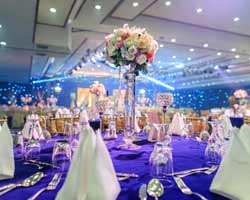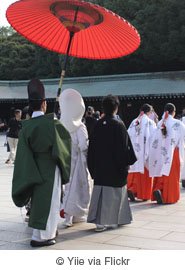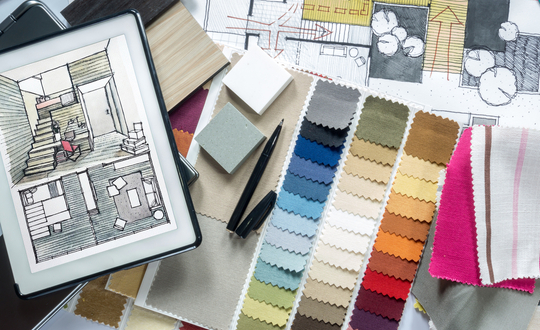
Your wedding venue frames the occasion. It should reflect your sensibilities as a couple; as a result, the quest for a wedding location involves a lot of creativity. “When couples are just starting to plan a wedding, I ask them questions like: What gets you excited? When have you been happiest? What have you enjoyed doing the most together?” says wedding and event planner Kelven Book. “With their feedback, we brainstorm and find a wedding setting.”
In choosing a wedding venue some of the first questions you should ask are: How many guests will there be? What season and what time of day will the wedding take place? Will the wedding be inside or outside? These choices tend to determine the dress and style of the wedding. The wedding location will influence your menu, decoration, and wardrobe, as well as issues of travel, lodging, and transportation.
Ideally, begin looking for your venue at least a year and half ahead of time. Search the Internet, local magazines and papers, for historical societies, hotels, and clubs where you might be able to have your wedding. Ask other couples for location recommendations. Think outside the box: weddings and wedding receptions have taken place everywhere from museums, to backyards, to concert halls, to nightclubs. If you hire a wedding planner he or she will also be able to give you information about interesting and lesser-known venues in your area.
Visiting Locations
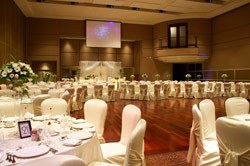
When you visit a site, assess the space and think about what effect you want to create. Look for wide-open spaces. Think about the size of the room. How can tables be arranged? Keep an open mind. Depending upon the scale of the room, proportions can be manipulated in intriguing ways. If you have already chosen your wedding colors, make sure the design of the room doesn’t clash with them. Also be sure to visualize the event from a guest’s point of view. Be cognizant of what guests will be looking at—whether it’s a mountain view or prints on the wall.
Imagine how music will sound. For instance, a long, echoey hall will affect the music being played. If you are having a band play at your reception, is there enough room for them and all their equipment? Will the level of sound be disruptive or uncomfortable?
NYIAD Top Tip:
Don’t forget to think about the lighting. “I cannot emphasize more the relevance of lighting,” writes Vera Wang in her book On Weddings. “The general atmosphere as well as the guests’ comfort level really rely on it. Ideally, lighting should soften and enhance.” Where photography is concerned, bad lighting will highlight the most insignificant flaws. However, the flattering possibilities for decorative lighting are limitless, and many couples hire a professional lighting designer to create the perfect ambience. If you plan to bring lights into the venue, make sure that there are enough electrical outlets to accommodate your needs.
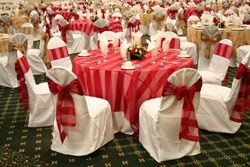
If the primary emphasis of the wedding reception is on food and wine, pay special attention to the areas where food and drinks will be served. Make sure there is enough space to separate eating, drinking, and partying areas, otherwise it may feel cramped.
It is important that you trust the venue that you work with. Check the references they provide. Ask what the establishment will take care of:
- Will food, drinks, and/or the wedding cake handled in-house?
- Are there extra fees if you bring in your own caterer?
- Will the venue provide decorations? Are there restrictions on the types of decorations that you can bring in?
- Is there security?
- How many people on staff will be working with you?
- How many hours will you have at the site?
- Will there be another party or ceremony right before or after yours?
- Is there a reception package? If so, what is included?
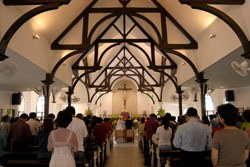
Learn the Location
Don’t go forward if you feel like you’re “settling”, or if the consultant at the venue seems tries to force ideas on you. Walk away if they want more than 50% of the rental up front, or if they refuse to draw up or sign a written contract. Also, look elsewhere if your event is being squeezed between two other parties–there might be tight or awkward time overlaps.
“When my husband and I looked at wedding venues, we looked at how well-thought out it seemed to be,” said Kim Baker who was married in March in Wisconsin. “Little details went really far.”
Her wedding venue was a former church –after the congregation moved to a new building it became a space for formal events. She noted that it was pretty easy to accomplish everything she and her husband wanted under one roof. After the ceremony, guests went downstairs for a cocktail reception while staff changed the upstairs area from ceremony seating to tables for dinner.
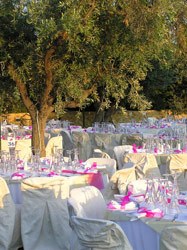
In choosing locations, trust your intuition. Pick a place where you feel comfortable. “If you fight the space, it will show,” says Kelven Book. It helps to have second opinions. Schedule meetings with potential or actual vendors and get their input on the location you are considering. If they can’t make it to the location beforehand, it’s helpful to provide them with a floor plan. Think about transitional space. How can you make things flow easily, with as little confusion as possible?
Stephen Fenwick of Chicago, Illinois had his wedding at the Marriot Resort in a suburb, Oak Brook. He says that a huge plus of working with their venue was that they helped the guests’transition smoothly from each part of the celebration to the next. Everything took place at the resort – the ceremony and reception. The Marriot took care of many elements of the wedding while still allowing Stephen and his husband to personalize the overall décor and cuisine.
In planning your dream wedding, remember that space affects the mood of any celebration; décor is what brings it to life. On your wedding day you don’t want to be weighed down with logistics, so plan carefully and choose a venue that will make things easier for you. Be imaginative and proactive.
Want to learn more? NYIAD can teach you how to become a wedding planner today!


